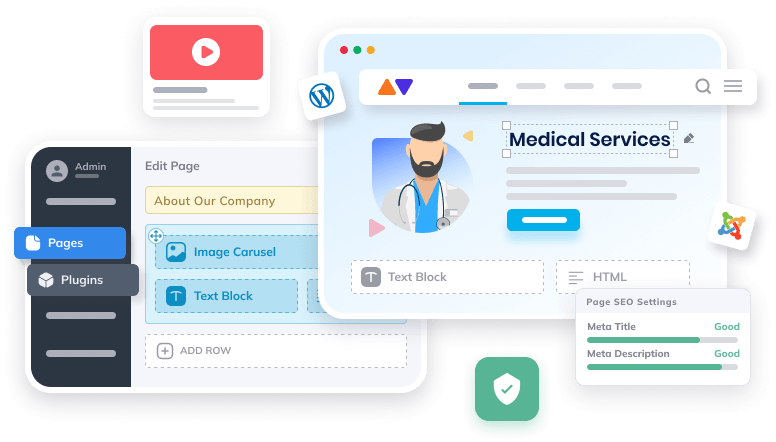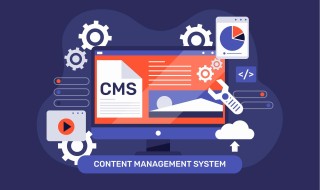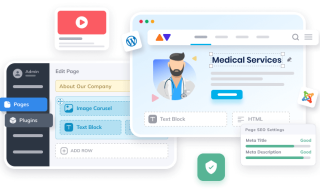
In today's digitally-driven world, a website is far more than just an online brochure; it's a dynamic hub for business operations, customer engagement, brand building, and revenue generation. But as your business grows and your digital presence evolves, managing website content – from blog posts and product pages to news updates and multimedia – can become a significant challenge. Without the right tools, keeping your site fresh, relevant, secure, and user-friendly can be a daunting, time-consuming, and expensive task, often requiring specialized technical skills for even minor updates.
This is where a Content Management System (CMS) steps in as an indispensable engine for your website. A CMS is a software application that allows users to create, manage, modify, and publish digital content without needing to delve into complex code. It empowers businesses to take control of their online narrative efficiently and effectively.
Understanding the multitude of benefits of a content management system is key to appreciating why it's not just a convenience, but a crucial investment for any serious online presence. This article will explore these advantages in detail, demonstrating how a robust CMS can fuel your website's success and support your business objectives, all while aligning with the principles of E-E-A-T (Experience, Expertise, Authoritativeness, and Trustworthiness).
What is a Content Management System (CMS)? A Clear Definition
A Content Management System (CMS) is a software platform that provides a user-friendly interface (typically web-based) for creating, editing, organizing, and publishing digital content on a website. One of its core strengths lies in the separation of content and design. This means content creators can focus on crafting compelling information using intuitive editors (often "What You See Is What You Get" - WYSIWYG), while the website's visual appearance, layout, and structure are consistently maintained by underlying templates and themes.
Common components of a CMS include:
- Content Editor: Allows easy creation and formatting of text, images, and multimedia.
- Media Management: A library for uploading, storing, and organizing images, videos, and documents.
- User Roles & Permissions: Enables administrators to assign different levels of access and control to various users.
- Templates/Themes: Pre-designed or custom-built structures that define the website's look and feel.
- Plugins/Extensions/Modules: Add-on components that extend the CMS's functionality (e.g., for SEO, e-commerce, contact forms).
CMS solutions can range from popular open-source platforms, which Webxloo can expertly customize and manage, to entirely custom-built CMS solutions that Webxloo develops to meet highly specific and unique business requirements.
Core Benefits of a Content Management System for Your Business
The benefits of a content management system are extensive, impacting everything from operational efficiency to marketing effectiveness and customer experience.
- Ease of Use & Simplified Content Management (No Coding Needed): This is perhaps the most celebrated benefit. A CMS provides an intuitive interface that allows non-technical users – marketers, content writers, sales teams, or business owners – to create, edit, and publish content directly. WYSIWYG editors often mimic word processors, making tasks like adding text, embedding images and videos, or formatting pages straightforward. This dramatically reduces the reliance on web developers for routine content updates, empowering your team to be more agile.
- Improved Efficiency & Faster Content Deployment: With a CMS, the entire content lifecycle—from creation and editing to approval and publishing—is streamlined. Updates that might have taken days or weeks when relying on manual coding can now be accomplished in minutes or hours. This agility allows businesses to respond quickly to market changes, launch promotions swiftly, and keep their website content consistently fresh and relevant. Many CMS platforms also offer content scheduling, allowing you to prepare content in advance and publish it automatically at a designated time.
- Consistent Branding & Professional Design: A CMS utilizes templates and themes to ensure a uniform look, feel, and structure across your entire website. This consistency is vital for reinforcing brand identity and providing a professional user experience. If a design change is needed, modifying the central template can apply the update site-wide, rather than painstakingly editing each individual page. This helps maintain brand integrity as your site grows.
- Enhanced Collaboration & Workflow Management: Modern businesses often have multiple team members involved in content creation and management. A CMS facilitates effective collaboration by supporting user roles and permissions. You can define who can create content (Author), who can edit and approve it (Editor), who can publish it (Publisher), and who has full administrative control. This structured workflow ensures quality control, accountability, and efficient teamwork. Version control features also allow you to track changes and revert to previous versions if needed.
- Powerful SEO-Friendliness & Optimization Capabilities: Search Engine Optimization is critical for online visibility. Many CMS platforms are designed with SEO in mind or offer robust plugins/modules to enhance SEO efforts. Key features include:
- Customizable URLs (Permalinks): Create search-engine-friendly and user-readable URLs.
- Editable Meta Tags: Easily modify title tags and meta descriptions for each page.
- Automated XML Sitemaps: Generate and update sitemaps to help search engines crawl your site effectively.
- Logical Header Tag Implementation: Structure content with H1-H6 tags.
- Image Optimization: Facilitate adding alt text to images.
- Mobile Responsiveness: Modern CMS themes are typically responsive by design. A CMS helps build an SEO-friendly site architecture, making it easier for search engines to crawl, index, and rank your content.
- Scalability & Flexibility to Grow: As your business expands, so will your website's content and traffic. A good CMS is built to scale, capable of handling an increasing number of pages, users, and data without performance degradation. Furthermore, the modular nature of many CMS platforms (via plugins, extensions, or custom development like that offered by Webxloo) allows you to add new features and functionalities as your business needs evolve – from e-commerce capabilities and interactive forums to membership portals and advanced analytics integration.
- Long-Term Cost-Effectiveness: While there can be an initial investment (especially for custom CMS development or premium themes/plugins), a CMS often leads to significant long-term cost savings. The ability for non-technical staff to manage content drastically reduces the ongoing need for expensive developer intervention for routine updates. Faster deployment times also mean your business can capitalize on opportunities more quickly.
- Improved Security (with Proper Management): Reputable CMS solutions, whether widely-used platforms or custom systems developed by experienced providers like Webxloo, incorporate security features and best practices. For popular platforms, regular security updates and patches are released to address vulnerabilities. User roles and permissions also play a crucial part in security by limiting access to sensitive areas of the website and its backend. However, it's vital to remember that website security is an ongoing responsibility that includes strong password policies, timely updates, and potentially additional security measures.
- Enhanced Web Accessibility: Making your website accessible to people with disabilities is not just an ethical imperative but also increasingly a legal requirement and good for SEO. Many CMS platforms support or can be extended to adhere to Web Content Accessibility Guidelines (WCAG). Features like easy alt text addition for images, proper heading structures, and keyboard navigation support contribute to a more accessible website.
- Centralized Control of All Content Assets: A CMS acts as a central repository for all your website's digital assets – text, images, videos, documents, and more. This makes it easier to organize, locate, update, and repurpose content, ensuring consistency and efficient asset management.
- Seamless Mobile Responsiveness: With a majority of web traffic originating from mobile devices, a responsive website design is non-negotiable. Most modern CMS platforms and their themes are built with mobile-first principles, ensuring your website adapts seamlessly and provides an optimal viewing experience across all screen sizes – desktops, tablets, and smartphones.
- Robust Integration Capabilities: Businesses rarely use a website in isolation. A CMS can often integrate with other essential business tools, such as Customer Relationship Management (CRM) systems, e-commerce platforms, analytics software, email marketing services, and social media channels. These integrations, often achieved through APIs or pre-built connectors, create a more cohesive and efficient digital ecosystem, enabling automated data flows and richer insights.
Choosing the Right CMS Approach for Your Business
Selecting the right CMS involves considering several factors:
- Business Goals and Complexity: What do you need your website to achieve?
- Technical Resources: What level of in-house technical skill is available?
- Budget: What is your initial and ongoing budget for development, maintenance, and potential licensing?
- Feature Requirements: What specific functionalities are essential now and in the future?
- Scalability Needs: How much do you anticipate your website and business growing?
- Security Demands: What level of security is required for your data and operations?
Options range from leveraging popular open-source platforms, which offer a wealth of themes and plugins, to opting for a fully custom-built CMS.
Conclusion: A CMS as Your Strategic Digital Asset
In conclusion, the challenge of managing a modern website effectively without a Content Management System is immense. The benefits of a content management system – ranging from profound ease of use, enhanced efficiency, and SEO advantages to improved collaboration, scalability, and cost-effectiveness – clearly demonstrate its critical role.
A CMS transcends being merely a technical tool; it is a strategic asset that empowers businesses to maintain a vibrant, engaging, and authoritative online presence. It enables you to articulate your expertise, build trust with your audience, and adapt swiftly in the competitive digital landscape. Investing in the right CMS solution is a foundational step for any business serious about its long-term online success and digital transformation.



 Phone Consultation
Phone Consultation
 Request a quote
Request a quote
 Text a Message
Text a Message